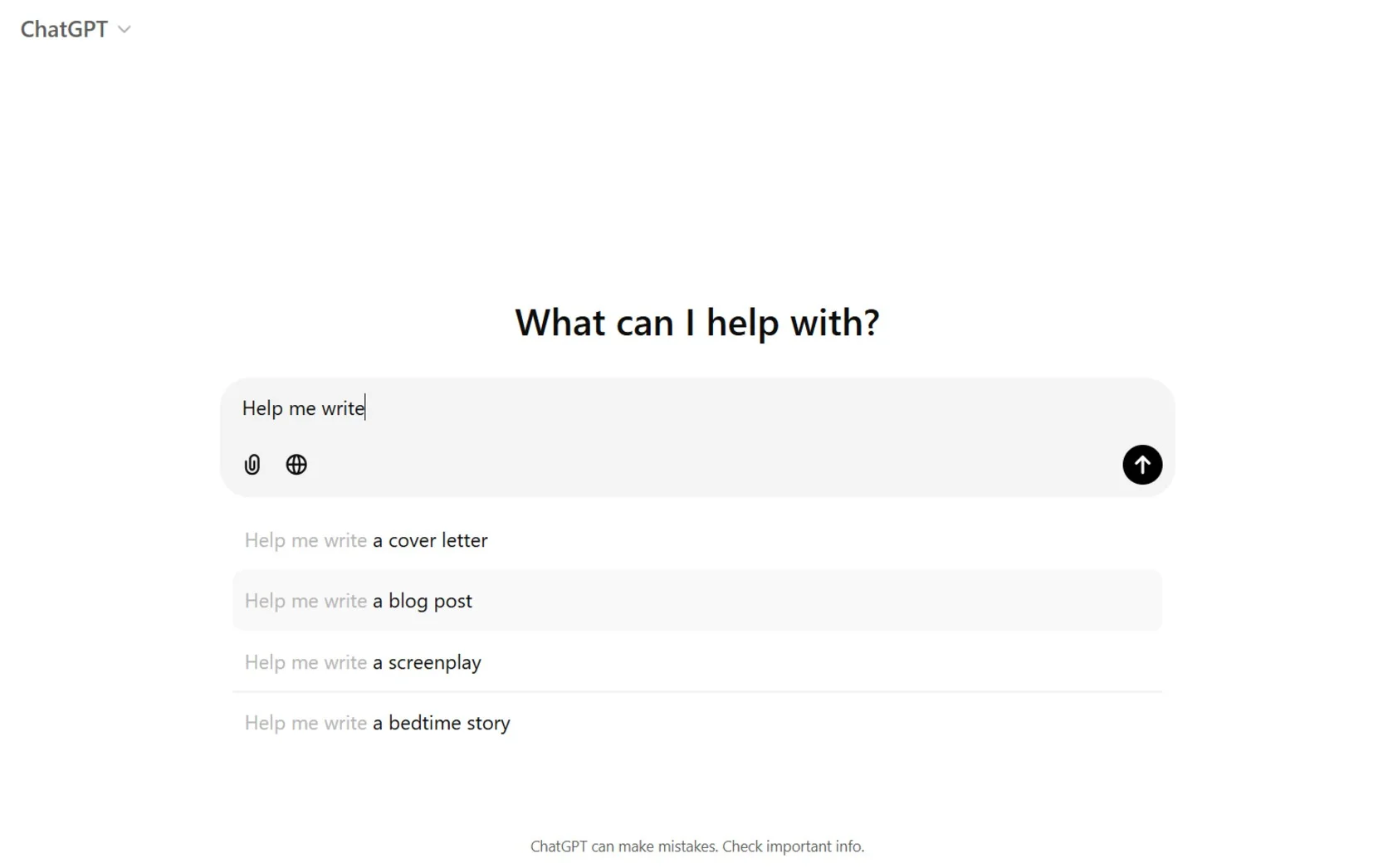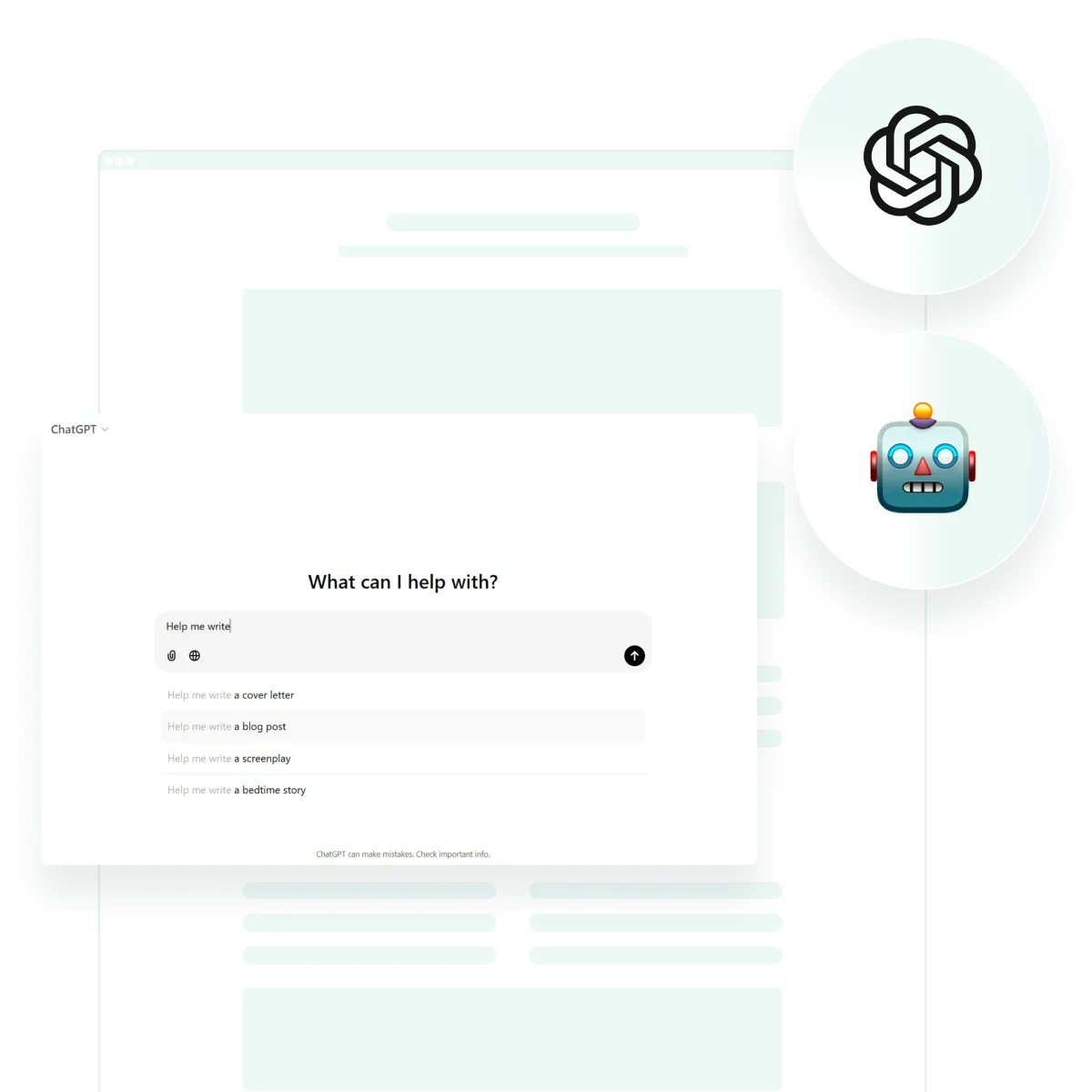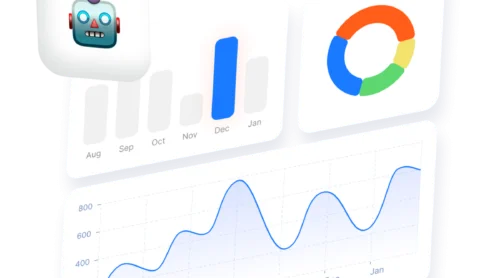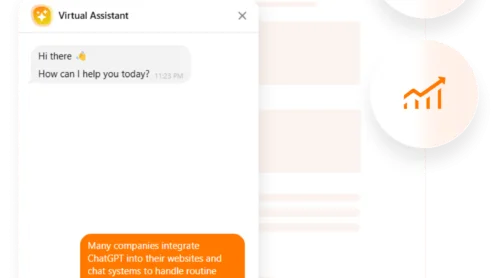In today’s digital world, having a well-optimized and engaging website is essential for businesses, bloggers, and content creators. A strong online presence not only attracts visitors but also helps improve search engine rankings and user experience. However, maintaining and optimizing a website requires time, effort, and expertise.
This is where ChatGPT comes in. This powerful AI assistant is on its way to revolutionize the way websites operate. It can assist in completing various tasks, saving time, increasing efficiency, and improving the overall website performance.
In this article, we’ll explore the various ways ChatGPT can enhance your website, including improving content quality, boosting SEO, conducting keyword research, and formulating SEO strategies.
Is Using ChatGPT for SEO Bad?
ChatGPT is not inherently bad for SEO, but like any tool, its effectiveness depends on how it’s used. When leveraged correctly, ChatGPT can significantly enhance your SEO efforts. Here’s how:
Benefits of using ChatGPT for SEO
- Time-saving. Automating repetitive tasks like writing outlines, conducting keyword research, and creating social media posts allows you to focus on more strategic activities.
- SEO best practices. ChatGPT can be trained to write with SEO in mind, such as incorporating relevant keywords naturally, ensuring readability, and creating compelling meta descriptions.
- Consistency. With ChatGPT, you can maintain a consistent flow of content across your website, improving your chances of ranking on search engines.
Potential pitfalls to watch out for
- Over-reliance on automation. While ChatGPT can assist with content creation, it’s still crucial to review the output to ensure quality, relevance, and alignment with your audience’s needs. Blindly relying on AI-generated content without human oversight could lead to poor quality or generic content that doesn’t meet users’s needs.
- Lack of originality. While ChatGPT can generate content quickly, it may lack unique, creative insights that can help your content stand out from competitors. Original content that provides real value is key for SEO success.
- Keyword stuffing. Although ChatGPT can optimize content for SEO, if not properly instructed, it might overuse certain keywords or phrases. Proper prompts and careful editing are essential to avoid keyword stuffing, which can harm rankings.
- User experience. SEO isn’t just about keywords — it’s about the overall user experience. ChatGPT might generate content that’s optimized for search engines but not always for the best user experience. Balancing optimization with engaging, useful content is key.
ChatGPT can be an incredibly powerful tool for SEO when used properly. However, like any AI, it requires careful direction and human moderation. As long as you prioritize quality, relevance, and originality, ChatGPT can help enhance your SEO efforts, not hinder them.
ChatGPT for Improving Website Content
High-quality content is a cornerstone of any successful website, whether it’s a blog, an online store, or a corporate site. Compelling and well-structured content not only draws visitors in but also improves search engine rankings, increases user engagement, and keeps audiences coming back. ChatGPT offers a range of capabilities that can help you generate, refine, and optimize your website content with ease.
Content generation
Creating fresh and engaging text consistently is often a time-consuming task. ChatGPT can streamline this process by assisting with the generation of content that’s tailored to your specific needs. Here are a few examples of what you can use the AI tool for:
- Blog posts. ChatGPT can help craft detailed, well-structured articles on a wide range of topics, offering insights, statistics, and relevant examples.
- Product descriptions. The AI can create persuasive and benefit-driven product descriptions designed to appeal to your target audience.
- Landing pages. With ChatGPT, writing compelling landing pages becomes simpler, helping you convert visitors into customers.
❗ATTENTION: While ChatGPT is a powerful tool for generating content and optimizing data, it’s important to review everything for accuracy, as it can occasionally make mistakes. Always double-check the content and data to ensure it meets your standards and requirements.

Enhancing readability
Creating great content is just the first step; presenting it in an effective way is equally important. ChatGPT can simplify complex ideas, break up long paragraphs, and enhance the overall flow of your content. Additionally, it can suggest better use of headings and subheadings, helping to make your content more organized and easy to navigate.
Adapting tone and style
Every brand has a distinct voice, and ChatGPT can adapt its writing style to reflect that. Whether your content needs to be formal, casual, technical, or persuasive, ChatGPT ensures the tone matches your brand’s personality and resonates with your audience.
- Legal websites. For a law firm, ChatGPT can generate authoritative and formal content.
- Fashion blogs. If you’re running a fashion blog, it can adopt a trendy, conversational tone.
- E-commerce product pages. For e-commerce, the AI can write persuasive, sales-driven materials that drive sales.
By integrating ChatGPT into your content creation process, you can generate high-quality, engaging, material that enhances user experience and, hence, improves your search engine rankings.
Keyword Research with ChatGPT
Effective keyword research is vital for improving SEO and driving relevant traffic to your website. Here’s how ChatGPT can enhance your keyword research process.
Finding new keyword opportunities
Generating a strong list of targeted keywords is essential for any SEO strategy. ChatGPT can assist in discovering new keyword ideas, including long-tail variations and question-based queries that users are searching for. By brainstorming diverse keywords, ChatGPT can help you capture a wider audience and optimize for different search patterns.
❗ATTENTION: Always check the keywords in a specialized software as ChatGPT can’t provide volume or search potential.
Analyzing search intent
Understanding the search intent behind a keyword is crucial for creating content that meets users’ needs. ChatGPT can help you identify whether a search is informational, navigational, transactional, or commercial, allowing you to tailor your content accordingly. This analysis ensures that you provide the most relevant answers to search queries, improving user experience and engagement.
Generate LSI Keywords
Latent Semantic Indexing (LSI) keywords are conceptually related terms that help search engines understand the context of your content. While Google has moved beyond traditional LSI in favor of more advanced semantic search algorithms, using related keywords and synonyms still improves content relevance and SEO. Here’s how ChatGPT can help you create a list of LSI words for your article.
| SEO task | How ChatGPT helps | ChatGPT prompt example |
|---|---|---|
| Generating related keywords | Suggests words and phrases that naturally complement your primary keyword, making content more diverse and contextually rich. | Generate a list of LSI keywords for [insert keywords]. |
| Expanding keyword variations | Provides synonyms and alternative phrasings to avoid keyword repetition while keeping the content SEO-friendly. | Provide alternative keyword variations for [insert keyword] to avoid repetition while keeping the content SEO-friendly. |
| Enhancing topic relevance | Includes semantically related keywords to structure content in a way that aligns with user intent, improving search rankings. | Suggest semantically related terms for the keyword [insert keywords]. |
| Improving content optimization | Analyzes existing content and recommends additional LSI keywords to make it more comprehensive. | Analyze this paragraph and suggest LSI keywords to improve SEO: [insert text]. |
By using ChatGPT for keyword research, you can uncover new opportunities, better understand search intent, and stay competitive in your industry, ultimately improving your SEO performance.
How to Use ChatGPT for SEO
Search Engine Optimization plays a pivotal role in increasing a website’s visibility and driving organic traffic. With search engines becoming increasingly sophisticated, optimizing your website’s content and structure has never been more important.
ChatGPT offers a valuable tool for optimizing your website’s performance by assisting with both content creation and technical SEO tasks.
ChatGPT for content and SEO
On-page SEO focuses on optimizing individual pages to improve their search engine rankings and attract relevant traffic. ChatGPT can assist with several key elements of on-page SEO, ensuring your content is both user-friendly and search-engine-friendly.
- Headings optimization. Proper use of headings (H1, H2, H3 tags) is crucial for both readability and SEO. ChatGPT can help ensure these headings are structured effectively and include relevant keywords.
- Image Alt text. Images are an important part of a webpage, but search engines can’t “see” them. ChatGPT generates keyword-rich, descriptive alt text for your images, which enhances accessibility and helps improve SEO.
- Internal linking suggestions. Internal linking boosts SEO by connecting different pages on your site, improving navigation, and allowing search engines to crawl and index content more efficiently. ChatGPT can identify opportunities for effective internal links across your website.
Meta descriptions and titles
Meta titles and descriptions play a crucial role in SEO and click-through rates (CTR). ChatGPT can help you create catchy, keyword-optimized meta tags that will increase visibility and drive more traffic to your site.
- Meta titles. ChatGPT can generate engaging, keyword-rich headlines that improve CTR.
- Meta descriptions. It can craft brief, compelling summaries designed to entice users to click on your page.
Technical SEO with ChatGPT
Technical SEO ensures that search engines can easily crawl, index, and understand the content on your website. ChatGPT can help with technical aspects of SEO, generating essential files and structured data that enhance the way search engines interact with your site.
- robots.txt. The robots.txt file provides instructions to search engine bots about which pages to crawl and which ones to ignore. ChatGPT can generate this file based on your website’s structure.
- Schema markup. Structured data helps search engines display rich results, such as product ratings or FAQ sections. ChatGPT can create schema markup, making it easier for search engines to understand and present your content in richer ways.
- XML sitemaps. An XML sitemap ensures that search engines can index all important pages on your site. ChatGPT can assist in creating and refining a sitemap to make sure search engines don’t miss any crucial content.
Utilize ChatGPT for SEO strategy
Content planning
When building a content strategy, you’ll need to create a roadmap of relevant topics that will both engage your audience and boost SEO. ChatGPT can help identify key topics and structure them into clusters, ensuring that your content resonates with potential customers while driving organic traffic.
Below is a detailed content strategy example for a new flower store, showcasing how ChatGPT can generate a rich, interconnected content plan.
| Main Topic Cluster | Subtopics | Content Type | Target Audience/Goal | Example Content Ideas |
| Floral Arrangements | – Types of bouquets (wedding, birthday, sympathy) | Blog post, landing page | Engaged couples, event planners, gift givers | “5 Unique Floral Arrangements for Weddings You’ll Love” |
| – Seasonal arrangements | Blog post, product page | Homeowners, flower enthusiasts | “The Best Flowers for Every Season: A Complete Guide” | |
| – DIY floral arrangement tips | Blog post, video tutorial | DIY enthusiasts, hobbyists | “How to Create Beautiful DIY Flower Arrangements at Home” | |
| Plant Care & Maintenance | – Flower care tips for longevity | Blog post, eBook guide | Flower buyers, plant lovers | “10 Tips for Keeping Your Flowers Fresh Longer” |
| – Indoor vs outdoor flower care | Blog post, email newsletter | Home gardeners, plant enthusiasts | “Indoor vs Outdoor Flower Care: What You Need to Know” | |
| – Common flower diseases & how to treat them | Blog post, FAQ section | Home gardeners, plant care beginners | “How to Identify and Treat Common Flower Diseases” | |
| Occasions & Gift Ideas | – Flowers for weddings, anniversaries, and holidays | Blog post, email campaign | Gift givers, event planners, couples | “The Perfect Floral Gifts for Every Occasion” |
| – Custom flower arrangements for corporate events | Product page, case study | Corporate clients, event coordinators | “How Custom Flower Arrangements Enhance Corporate Events” | |
| – Sympathy flowers and their meanings | Blog post, product page | Grieving families, gift shoppers | “The Meaning Behind Sympathy Flowers: A Guide for Thoughtful Gifting” | |
| Flower Subscriptions | – Benefits of flower subscription services | Landing page, testimonial section | Busy professionals, gift givers, home decor lovers | “Why You Should Sign Up for Our Monthly Flower Subscription Box” |
| – How flower subscriptions work | Blog post, FAQ section | Curious shoppers, new customers | “How Our Flower Subscription Service Brings Fresh Blooms to Your Door Every Month” | |
| – Unique and personalized subscription options | Blog post, promotional email | Customizers, high-end clients | “Personalized Flower Subscription Boxes: The Perfect Gift That Keeps on Giving” | |
| Seasonal Flowers & Trends | – Best flowers for Spring/Summer/Fall/Winter | Blog post, product page | Seasonal shoppers, event planners, florists | “Must-Have Spring Flowers to Brighten Your Home” |
| – Trending flowers for the current year | Blog post, social media post | Trend-followers, home decorators | “2025’s Top Floral Trends You Need to Know About” | |
| – Flower sustainability and eco-friendly options | Blog post, sustainability page | Eco-conscious shoppers, garden enthusiasts | “Sustainable Flowers: How We’re Bringing Eco-Friendly Blooms to You” |
ChatGPT SEO audits
SEO audits are essential for diagnosing and addressing any technical or content-related issues that may hinder your website’s performance. ChatGPT can help you perform basic audits, pinpoint areas that require improvement, and suggest targeted fixes.
For instance, if you notice that your flower store isn’t ranking well, ChatGPT can identify gaps such as missing alt text on product images or inefficient keyword use in blog posts. It will then recommend practical steps, such as adding more keyword-rich alt text or reorganizing your content for better readability and SEO.
Backlink outreach
Backlink building is an ongoing effort to improve your website’s domain authority and search engine ranking. ChatGPT can streamline the backlink outreach process by generating customized email templates for reaching out to bloggers, influencers, and other websites in your industry.
Whether you’re targeting wedding planners, lifestyle bloggers, or other businesses in the floral industry, ChatGPT can help you create compelling messages that highlight the value of your website and encourage backlinks.
ChatGPT for SEO: Use Cases
Apart from the discussed article or product descriptions, ChaGPT can be used for search engine optimization of other pages on your website.
Homepage optimization
ChatGPT can help refine the main messaging of your homepage, ensuring the text is clear, engaging, and optimized for relevant keywords that align with user intent. This ootimization will boost the website’s first impression, improving bounce rates, and strengthening initial search engine visibility.
Category pages for products/services
ChatGPT can assist in writing concise, engaging copy for your category pages, ensuring that keywords specific to each product/service category are naturally incorporated. As the result, users will navigate your offerings easily, increasing the chances of your ranking for specific product-related queries.
Error pages
While not often prioritized, a 404 page is one of the key opportunities for both improving user experience and boosting SEO. ChatGPT can craft a user-friendly and helpful 404 page that redirects to popular pages and includes relevant keywords.
Newsletter sign-up pages
ChatGPT can generate compelling calls-to-action (CTAs) for newsletter sign-up pages, making the pitch appealing and SEO-optimized by including targeted keywords related to special offers and products. Such improvement increases conversions for your email list and helps drive repeat traffic from subscribers.
‘About Us’ page
ChatGPT can assist in writing an engaging ‘About Us’ page that explains your brand story while optimizing the text for SEO, incorporating relevant keywords. This will enhance trust, improve user experience, and boost local ranking.
Best ChatGPT Prompts for SEO Tasks
Content Creation & Optimization
- Generate 10 blog post ideas based on [keyword]
- Write a compelling meta description for [page topic]
- Create an SEO-friendly outline for an article about [topic]
- Rewrite the following paragraph to be clearer, more engaging, and SEO-friendly: [insert text]
- Write a 500-word blog post on [topic], including keywords like [list of keywords]
Keyword Research & Strategy
- Suggest 10 long-tail keywords related to [keyword]
- What are the search intents behind these keywords: [keyword 1], [keyword 2], [keyword 3]?
- Generate a list of related keywords and topics for [keyword] to enhance internal linking
SEO Audit & Technical SEO
- Suggest 5 improvements for on-page SEO for a page about [topic]
- Generate an SEO audit checklist for a website selling [product/service]
- Create an SEO-friendly URL structure for a blog post about [topic]
Local SEO
- Create a Google My Business profile description for a [business type] in [location]
- Suggest 5 local SEO strategies for a [business type] in [city/region]
- Write a location-based meta description for a page targeting customers in [location]
Social Media & External SEO
- Write a social media post that promotes [topic] and includes SEO keywords like [keywords]
- Create a compelling call-to-action for encouraging reviews on my [business] page
- Suggest 5 email subject lines for a newsletter about [topic] that include [keywords]
Featured Snippet & Structured Data
- Write a 50-word answer to the question ‘[question]’ to be used as a featured snippet
- Suggest 5 FAQ questions and answers for a page about [topic], optimizing for long-tail keywords
- Generate schema markup for a product page about [product]
Backlink Strategy
- Generate a personalized outreach email template to request backlinks from websites in the [industry] niche
- List 5 potential link-building opportunities for a website in [industry]
Conclusion
Leveraging ChatGPT for SEO tasks can significantly streamline your efforts, making it easier to create high-quality, optimized content, conduct keyword research, perform technical SEO, and develop strategies for local and external SEO. With the ability to generate everything from blog post ideas to detailed meta descriptions and even outreach emails, ChatGPT becomes an invaluable tool in any digital marketer’s toolkit.
By incorporating these actionable prompts into your SEO workflow, you can ensure that every aspect of your website is optimized for higher rankings, better user engagement, and increased organic traffic. With ChatGPT, SEO tasks become not only more efficient but also more effective, helping you stay ahead of the competition and achieve long-term success.






